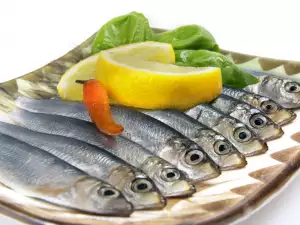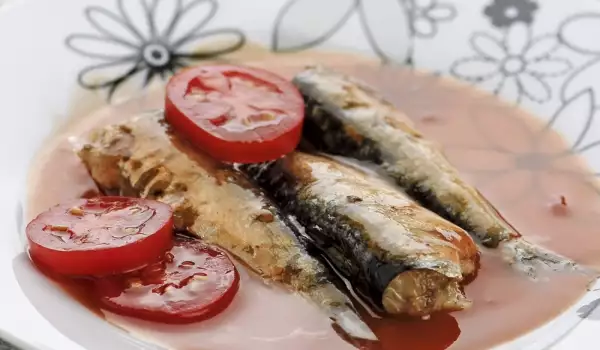Sardines /Sardina pilchardus/ porbeagle is a type of sea fish, which is also known as pilchards. This fish is very common in the Mediterranean Sea and the Atlantic Ocean, is found in small quantities in the Black Sea. Sardines eat mostly plankton.
Sardines reach up to 26 cm in length. Sardines caught in the Atlantic Ocean are about 25 cm and other fishermen catch mostly sardines in size between 17 and 18 cm and a weight of 25 to 50 g. The abdominal wall of sardines forms a line of unequal scales. Behind the top of the gills are dark circular spots that are arranged in a row towards the tail.
Sardine is a fish that has warm temperatures and live in herds. It reaches sexual maturity at two years, when the average length is 13 cm from May to December sardines throw out about 50 thousand grains of caviar. They grow very fast with long breeding migrations.
Sardines are caught mainly at night, when they rise to the surface to feed on the nearby plankton. After capture, the fish are immersed in brine to be transported to shore.

Composition of sardines
Sardines, like other fish are rich in nutrients. Sardines have one of the most concentrated sources of omega-3 fatty acids. They are also one of the richest food sources of vitamin B12. In the sardines are found very valuable amino acids such as aspartic and glutamic, leucine, lysine, methionine, valine, threonine. They have large amounts of folic acid, vitamin E and biotin.
With a tin of sardines, approximately 90 g has 137% of the daily requirement of vitamin B12, 69% of the needs for selenium, 62 percent of vitamin D, 57 percent of the need for omega-3 fatty acids and about 45% of the need for day of phosphorus and protein.
Selection and storage of sardines
In places, sardines are found most often in the form of cans. By buying canned, look for the label shelf-life and information about the manufacturer. However, in some places you can buy sardines in fresh form.
Like other fish, sardines should not have a bad smell, the eyes should be clear. This is a sign of fresh fish. Canned sardines can be stored for a long time after you open them best keep them in the fridge. Fresh sardines must be prepared immediately after purchase, or the next day.
Cooking Sardines
In countries that have a particular economic significance, sardines are preserved in different ways. At the cannery the fish are cleaned and then cooked by steaming being or deep-fried and dried. In Spain, In Portugal and several other countries, after pretreatment sardines are preserved in olive oil or soybean oil as the Scandinavian countries smoke them. They can be preserved with mustard or tomato sauce.
The main purpose of sardines is for human consumption, but sardine oil is widely used in the manufacture of paints, varnishes, linoleum and more.

Sardines require cleaning before being cooked. For this purpose, remove scales by scraping, remove the entrails and heads. Wash the cleaned fish under running water.
If you want to give yourself marinated sardines, we offer a very easy and fast way. Cleaned sardines stay overnight in strong salted brine, and the next day are moved to vinegar. Then drain them and put them in small pots. Pour heated oil in each jar and put 2 grains pepper and 1-2 bay leaves in.
Here is a great Mediterranean recipe for grilled sardines. For this, you need 500 grams of fresh sardines, a few olives, clove of garlic, 2 tomatoes, 10 leaves of basil, salt, olive oil and pepper.
Cleaned sardines are arranged in a baking dish. Tomatoes, garlic, basil and half of the olives are steamed briefly in olive oil. Finally, sprinkle with salt and pepper. The resulting mixture is poured with the sardines into the tin and baked for 8-10 minutes in a highly preheated oven. Serve hot sardines sprinkled with the remaining basil.
Benefits of sardines
As mentioned, sardines are a valuable source of omega-3 fatty acids and vitamin B12. Omega-3 reduces triglycerides and cholesterol in the blood. Sardines maintain the balance of homocysteine and its effects have a beneficial effect on the heart.

Sardines are an excellent source of protein, which is vital for building muscle and connective tissue. Furthermore, they support the immune system, thereby providing better health.
Sardines are particularly useful in the fight against osteoporosis. They provide high amounts of vitamin D, calcium and phosphorus - the whole complex required for building and maintaining healthy bones. Sardines have such large amounts of vitamin D that can be compared only with fortified milk.
Moreover, vitamin D participates in the regulation of cellular activity. Therefore, it is believed that it plays a crucial role in preventing some cancers diseases. Selenium in Sardines is also valuable in the fight against cancer.






















